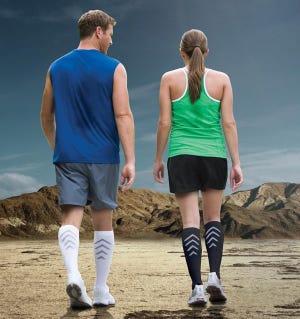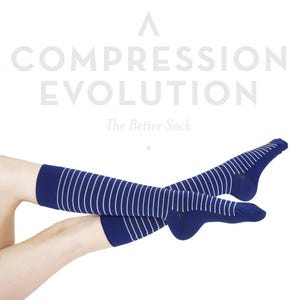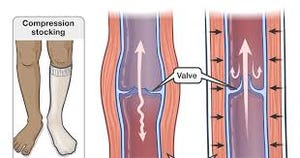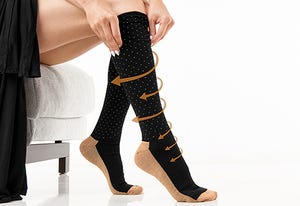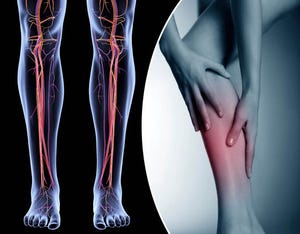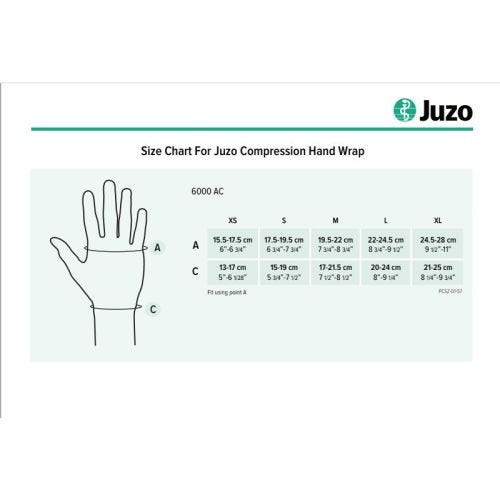Compression sleeves provide graduated compression to a runner’s legs as they run to prevent several physical issues that plague athletes. (Graduated pressure means that the sleeve is tighter and provides greater pressure in certain locations, like the ankle, and then gradually provides less pressure as the sleeve moves up the runner’s leg.) While compression sleeves might be trending as of late due to their appealing appearance, it’s important to note that their benefits extend beyond providing a cool look and are actually backed by many scientific studies.
What Makes Compression Sleeves Effective?
Before looking at the benefits runners can experience when incorporating compression sleeves into their daily run, it’s important to understand the science behind the product itself. Compression sleeves have been specifically designed to improve athletic performance both in terms of recovery and as it relates to a runner’s circulatory system.
To better understand how this works, first consider the fact that the human body pumps blood through the arteries into the muscles. Each cell within the body then receives necessary oxygen and nutrients from this blood. The then depleted blood makes its way back to the heart and the process begins all over again and repeats. Compression sleeves affect this process by providing graduated pressure to a runner’s calves, which subsequently helps the body fight the natural effects of gravity and makes this nutrient and oxygen moving process more effective. In turn, this means the body is moving around more oxygenated blood, allowing the muscles to function at a higher level.
The effectiveness of wearing compression sleeves doesn’t stop with improved circulation; however, because compression garments have also been shown to decrease the amount of muscular vibration the muscles experience by supporting the muscles as a runner is working out. Of course, the act of running typically causes a great deal of vibration, which in turn leads to muscle fatigue. Compression sleeves help alleviate some of this muscular stress and subsequently helps a runner improve their endurance by keeping their muscles from becoming overtired.
Benefits of Compression Sleeves For Running
Science proves that compression sleeves do help runners in several notable ways. The following is a breakdown of the benefits runners can expect to enjoy when making compression sleeves part of their running gear:
They Can Reduce Swelling
In some studies, compression technology has been proven effective at limiting swelling for those who spend several hours on their feet. While the linked study was mainly evaluating occupational benefits for workers who spend their workdays on their feet, the same logic can be used when considering runners. Athletes who run long trails would certainly qualify as “being on their feet” for several hours. Therefore, a reduction in swelling is one proven benefit for runners who wear compression sleeves when taking a long run.
Protects The Legs
Another notable benefit provided by compression sleeves is protection for the legs. When runners run off-road, especially in the woods on muddy, poison-ivy-infested trails, compression sleeves can actually prevent damage to a runner’s legs by covering their shins. It also can keep them from having to spend time after their run scraping caked-on mud off their legs. Runners can simply remove their filthy compression sleeves and toss them in the wash. Runners are also protected from low-hanging limbs/branches or briars that would otherwise cut up their legs when they run through.
Promotes Recovery, Reduces Pain
Compression sleeves work to effectively boost the lymphatic system of the body, which in turn reduces inflammation. This is part of what leads to the increased circulation outlined above. Consequently, because the blood is pumping better through the body and inflammation is reduced, runners who wear compression sleeves typically note a reduction in overall muscle pain and an improved recovery time after a hard workout. This same benefit can also help reduce the potential for running-related injuries which can sadly sideline a dedicated runner.
Improves Performance
While compression sleeves won't necessarily make a runner faster, they can improve muscular fatigue as mentioned above. This means that runners who make compression sleeves part of their running gear should in theory be able to endure more miles of running thanks to their improved circulation and more oxygenated and supported muscles. This could lead to an improved running time or longer run completion.
Compression Sleeves Aren’t Miracle Workers but Help!
The information above outlines several benefits associated with compression sleeves when it comes to running. Runners who make them part of their gear can expect to benefit in several ways, including improved recovery time, and a reduction in pain and potential injuries. Therefore, while they are not miracle workers that will suddenly make a runner faster, compression sleeves can help runners endure more and perform better overall.



